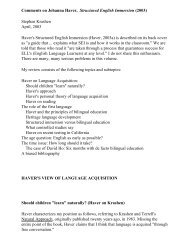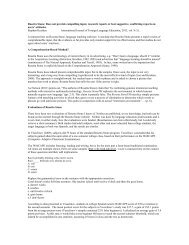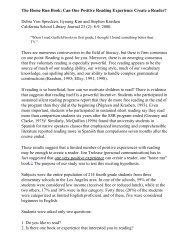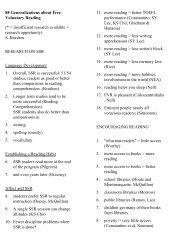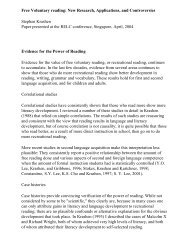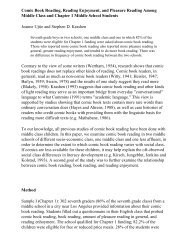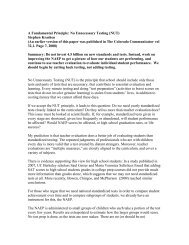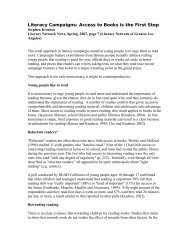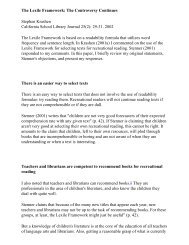Second Language Acquisition and Second ... - Stephen Krashen
Second Language Acquisition and Second ... - Stephen Krashen
Second Language Acquisition and Second ... - Stephen Krashen
Create successful ePaper yourself
Turn your PDF publications into a flip-book with our unique Google optimized e-Paper software.
performance..." (p.35). Corder (1967), citing an unpublished paper by Lambert, also<br />
discusses the acquisition-learning distinction <strong>and</strong> the possibility that acquisition is<br />
available to the adult second language performer.<br />
The Monitor Theory differs somewhat from these points of view, in that it makes<br />
some very specific hypotheses about the inter-relation between acquisition <strong>and</strong><br />
learning in the adult. In the papers that follow, I argue that this hypothesis sheds<br />
light on nearly every issue currently under discussion in second language theory <strong>and</strong><br />
practice.<br />
Conditions of Monitor Use<br />
There are several important constraints on the use of the Monitor. The first<br />
condition is that in order to successfully monitor, the performer must have time. In<br />
normal conversation, both is speaking <strong>and</strong> in listening, performers do not generally<br />
have time to think about <strong>and</strong> apply conscious grammatical rules, <strong>and</strong>, as we shall<br />
see later, we see little or no effect on the Monitor in these situations. This condition,<br />
however, is necessary but not sufficient. Heidi Dulay <strong>and</strong> Marina Burt have pointed<br />
out to me that a performer may have time but may still not monitor, as he or she<br />
may be completely involved with the message. There is, thus, a second condition:<br />
the performer must be "focused on form", or correctness. As we shall see later, the<br />
second condition predicts some recent data nicely.<br />
An important third condition for successful Monitor use is that the performer needs<br />
to know the rule, he or she needs to have a correct mental representation of the rule<br />
to apply it correctly. This may be a very formidable requirement. Syntacticians<br />
freely admit that they have only analyzed "fragments" of natural languages, applied<br />
linguists concede that they have mastered only part of the theoretical literature in<br />
grammar, language teachers usually do not have time to fully study the descriptive<br />
work of all applied linguists, <strong>and</strong> even the best language students do not usually<br />
master all the rules presented to them.<br />
It is therefore very difficult to apply conscious learning to performance successfully.<br />
Situations in which all three conditions are satisfied are rare (the most obvious<br />
being a grammar test!).<br />
3



